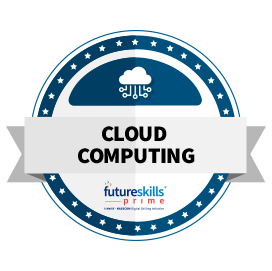Course Provider

What will you learn in this Cloud Architect Master’s Program course?
- Understanding of cloud computing, service models
- Ability to design secure, scalable cloud solutions and knowledge to select the best platforms
- Proficiency in designing scalable, secure cloud architectures and cloud-native development
- Practical skills required to build an end- to-end cloud application/service
- Expertise in ensuring that the architecture is secure and compliant with regulatory standards
Cloud Architect Master’s Program
-
 Skill Type
Emerging Tech
Skill Type
Emerging Tech -
 Domain
Cloud Computing
Domain
Cloud Computing -
 Course Category
Deepskilling Course
Course Category
Deepskilling Course -
 Placement Assistance
Yes
Placement Assistance
Yes -
 Certificate Earned Joint Co-Branded Participation Certificate & Partner Completion Certificate
Certificate Earned Joint Co-Branded Participation Certificate & Partner Completion Certificate -
 Nasscom assessment Available
Nasscom assessment Available -
 Course Covered under GoI Incentive
Yes
Course Covered under GoI Incentive
Yes -
-
 Course Price
INR 1,62,000+ 18% GST
Course Price
INR 1,62,000+ 18% GST -
 Course Duration
132 Hours
Course Duration
132 Hours
-
Why should you take Cloud Architect Master’s Program course?
- Gain knowledge of cloud architecture service and acquire practical knowledge of building complete system using cloud services
Who should take this Cloud Architect Master’s Program course?
- Any individual who wants to pursue career in cloud technologies.
- Anyone interested in designing cloud networks, end - to - end systems on cloud, have a good in-depth working knowledge and understanding of clous services.
Curriculum
- Cloud Infrastructure Fundamentals
- Cloud Security and Compliance
- Cloud Architecture and Design
- Cloud Services and Providers
- Cloud Networking and Connectivity
- Cloud Monitoring and Management
- Cloud Mitigation and Strategy
- DevOps & Continuous Integration/Continuous Deployment (CI/CD) in Cloud
- Cloud Governance and Compliance
- Advanced Cloud Architecture and Emerging Technologies
Tools you will learn in Cloud Architect Master’s Program course-
- UiPath
- Automation Anywhere
- Blue Prism
- C#
- Python
- SQL
FAQs
Typically a bachelor's degree in a relevant field is required, along with proficiency in programming and understanding of networking concepts. Some programs may require relevant work experience.
Yes, applicants with a non-technical background may apply. Some programs offer preparatory courses to build necessary skills.
Topics include cloud computing fundamentals, service models, deployment models, security, migration strategies, management tools, and DevOps practices.
Courses may be offered online, on-campus, or in hybrid formats to accommodate different schedules and preferences.
What career paths do graduates typically pursue? Graduates typically pursue roles such as cloud architect, solutions architect, consultant, engineer, administrator, or DevOps engineer across various industries.
Prospective students are encouraged to research specific programs for detailed information on admission, curriculum, structure, and career outcomes.



